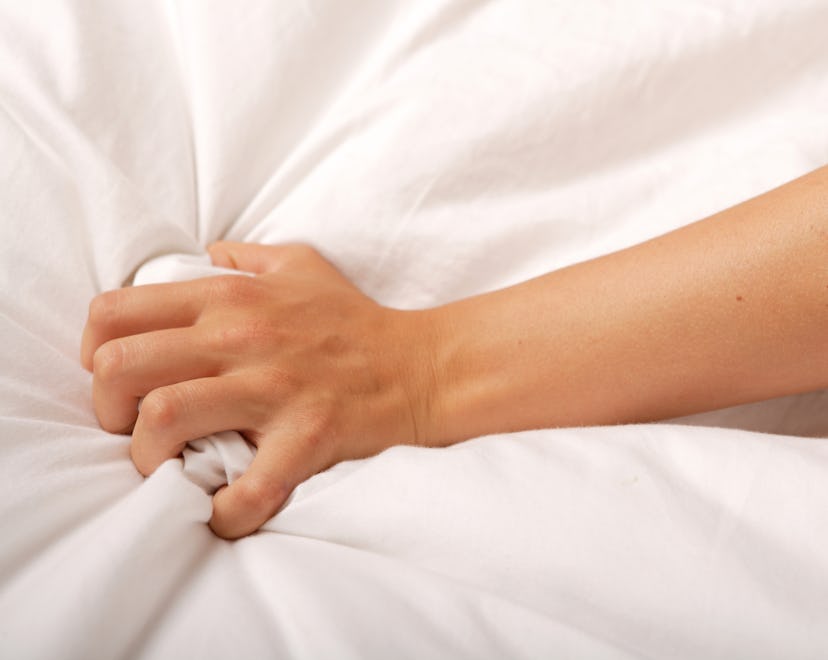Trying

Does Masturbating Reduce Sperm Count? Experts Explain
Here’s what you need to know if you’re trying to get pregnant.
Trying to conceive can be a long, stressful journey. What may be a relatively simple process for some, can end up being a lot of trial and error for others. I remember changing my diet, my exercise routine, and tracking my ovulation and timing intercourse during my fertile window when I was trying to get pregnant. But what about your partner? Is there anything he can do to optimize your chances of getting pregnant? His sperm obviously plays a huge role in conception, so what is the correlation between masturbation and sperm count? If he’s not tuckered out already from all of the marathon sex you’re probably having as you try to get pregnant, is it OK for him to be intimate with himself in between romps in the sheets? Or does masturbating reduce sperm count?
Does masturbating reduce sperm count?
Masturbation is generally not thought to have any effect on sperm count or an ordinarily healthy man’s fertility, says Peter Rizk, an OB-GYN and fertility expert for Fairhaven Health. There is a caveat, however. “But if you have been diagnosed with low sperm count, it’s recommended when trying to conceive that you not ejaculate for two-to-three days for optimal sperm quantity.”
Does porn affect sperm count?
“This is really a matter of nuance, as sperm count can both be improved or made worse by watching porn,” says Laura Erlich, fertility and obstetric specialist and founder of Mother Nurture Wellness.
In fact, there is data showing that porn actually improves sperm quality. Erlich says, “This may be because porn could elicit emotions of excitement akin to having sex with a new partner, which can be beneficial for fertility.”
And it’s not just the quality that may be improved, it’s also good for sperm to be relatively fresh. “Many men who are wanting to conceive do so under the misconception that their sperm should be ‘stored up’ until it’s their partner's ovulation.” Erlich says. “Because the testes are constantly making sperm, it’s actually optimal not to let it sit around for too long. For that reason, sperm is optimized when a man ejaculates at least twice a week,”
Sperm count is a factor in fertility, but the calculus isn’t totally simple. And, there is such a thing as too much of a good thing. “It is possible to overdo it, especially if sperm counts are low to begin with. For that reason, aiming for ejaculation every other day gives sperm enough time to regenerate to numbers that are more likely to lead to conception,” she says.
How important is sperm count when trying to conceive?
“Sperm count, motility, and morphology are the keys to fertility in men who are trying to conceive via intercourse,” says Erlich. “The overall count, shape, and movement of the sperm will determine whether intervention is needed,” she says.
In fact, the average sperm count among men has decreased by 50% since 1938, says Rizk. Though sperm count does matter when trying to conceive, it is not make-or-break. “Normal sperm count is at least 15 million sperm per milliliter of semen,” Rizk says. “If you have less than that your doctor will probably tell you that you have low sperm count, or oligospermia. When you don’t have enough sperm there is less of a chance that a sperm will reach and fertilize the egg,” he explains.
How can you increase male fertility?
Finding out that you or your partner has a low sperm count can be stressful if you’re hoping to get pregnant, but it’s not the end of the road by any means. There are lots of things you can do to optimize your chances of conceiving. “Reproductive health is a reflection of overall health, which means it is still very important to eat well, avoid alcohol, cannabis, and other medications that may harm sperm,” Erlich says.
In other words, load up on veggies and focus on living a super healthy lifestyle, because it really can support fertility. “Your sperm health is affected by many variables, including your diet,” Rizk says. “The life cycle of sperm is roughly three months (how long it takes for new sperm to form) so living a healthy lifestyle is important even before you are actively trying to conceive.”
“It’s recommended that you eat a healthy, balanced diet, full of rich greens and antioxidants and take vitamins and supplements daily to improve your overall reproductive health … or take a multivitamin and antioxidant-based fertility support supplement,” he says.
If making lifestyle changes doesn’t work, it may be time to consider fertility testing.
When should you consider fertility testing?
“Generally it’s recommended that both partners consider fertility testing after a year of trying to conceive (6 months if over the age of 35),” says Rizk. “More recently, conception-age couples have started requesting preventative fertility testing so they know what to expect when they are ready to try and conceive. This information may help them get ahead on improving their fertility with diet, supplements, and lifestyle changes,” he says.
While masturbation and porn may even help with sperm count in some instances, it’s important to not overdo it. Even though masturbating doesn’t typically cause issues with male fertility, if you suspect you or your partner may have a low sperm count, don’t ejaculate for two-to-three days prior to timed intercourse if you’re trying to conceive.
Sources Interviewed:
Peter Rizk, M.D., OB-GYN, fertility expert for Fairhaven Health.
Laura Erlich, LAc, FABORM, fertility and obstetric specialist and founder of Mother Nurture Wellness.
Studies referenced:
Kilgallon, S. J., & Simmons, L. W. (2005). Image content influences men's semen quality. Biology letters, 1(3), 253–255. https://doi.org/10.1098/rsbl.2005.0324